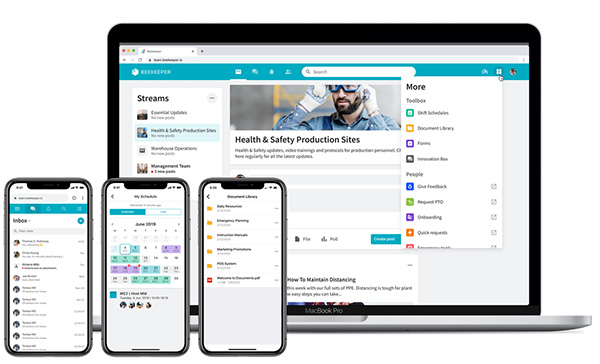Bridging the gap: addressing safety and recognition to combat frontline work attrition in manufacturing and construction.
By Cristian Grossmann CEO And Co-Founder, Beekeeper
Among frontline workers today, restlessness is the norm. Across industries as diverse as hospitality, construction, and healthcare, we are seeing the same patterns: attrition rates are higher, overall productivity is lower, and everyone—workers, managers, and employers—is paying the price.
Much of this can be attributed to the “Frontline Disconnect.” The term refers to how managers and (especially) head office workers struggle to comprehend the needs of those working on the frontline. This disconnect isn’t intentional: leadership is often desperate to know more about what their employees are thinking. However, communications channels currently in place across frontline workspaces are inadequate. The mutual lack of understanding that results from this is harming companies as much as individual frontline workers.
Recently, Beekeeper polled 8,000 frontline workers, managers, and head office employees to open those communication channels and determine current sources of frontline discontent. The results were illuminating for a number of industries. But the results, as they specifically relate to manufacturing and construction help to vividly sketch the contours of what frontline workers are dealing with—and what their superiors are struggling to understand.
As the report makes clear, compensation is at the forefront of today’s frontline workers. This is not a surprise: with inflation and the cost of living rising, workers will inevitably feel financially squeezed. But it’s worth noting that wages tell us only one part of the story. Talking to manufacturing and construction workers, another concern emerges just as often: making sure safety maintains a top priority for them and their roles.
This problem is particularly acute in construction and manufacturing, where workers are often tasked with operating potentially dangerous machinery. The numbers bear this out: where 33% of workers overall listed a safe, fun, and nurturing work environment as their number-one motivator, that number rose to 39% for both construction and manufacturing workers. Meanwhile, while 20% of frontline workers list safety concerns as a primary stressor, that number is 30% for construction workers.
I have dealt extensively with frontline employers and know they care deeply about their workers’ safety. But there is a persistent sense, on the frontline itself, that more needs to be done. This sense contributes to the high turnover rates we’re currently seeing in construction and manufacturing—costing employers a fortune in re-recruitment.
It isn’t just about physical safety. Workers also want to feel recognized for their work. Here, the data draws a stark contrast: survey results consistently show that managers and front office employees underestimate the importance of positive feedback to frontline workers, particularly positive feedback from peers (in fact, in manufacturing, managers overestimate how much their own feedback matters).
Recognition here refers not merely to feedback but to a sense that the employer is invested in the frontline worker’s overall well-being and future prospects. Consistently, frontline workers told us that they want a diversity of tasks and a clear pipeline towards advancement.
Workplaces that aren’t actively striving to create a more nurturing environment are suffering for their neglect. Workplace toxicity ranks as a consistent driver of attrition in both manufacturing and construction. Communication between frontline workers, management, and front office workers has broken down in every direction, but addressing this frontline disconnect can be fixed.

How can we go about fixing this problem?
Let’s start with something as simple as shift-scheduling. Among frontline workers in both manufacturing and construction, this was a continual complaint: workers find current shift-scheduling procedures inflexible and frustrating. The wide-scale reshuffling of priorities that followed the pandemic has made it so that work-life balance is a top priority. Without the ability to effectively schedule or swap shifts, they feel robbed of agency, which inevitably drives up dissatisfaction.
The same applies to communication: currently frontline workers in construction and manufacturing feel they lack the tools to properly communicate not merely with managers and head office employees but with their own teammates. They also feel that the instructions they are given are often unclear and that tasks are delegated without adequate thought given to who is best trained to complete them. All this ties back to safety. Per the data, poor communication has led to a distressing lack of awareness around safety protocols.
In this respect, digital solutions designed to streamline and simplify communication within and across teams have an invaluable role to play. After all, tools like these are already a staple of white-collar employment, where seemingly every possible task has a corresponding app. There is no reason why this digital productivity revolution, which has overhauled office work, should bypass frontline workers. Frontline workers, build the buildings in which office workers work. They assemble the chairs that office workers sit in. And they deserve much better than a frontline disconnect as the status quo.

Cristian Grossmann is the CEO and co-founder of Beekeeper, which solves the disconnect between frontline workers and their managers in the construction, healthcare, hospitality, and manufacturing industries. Cris started his career in frontline work, and understands first-hand the technology that is required to make the frontline workforce more effective. Prior to founding Beekeeper, he worked for Accenture on high profile international projects in the field of IT Strategy for the financial and public sectors. Cristian studied Chemical Engineering and got his Ph.D. in Electrical Engineering, both at ETH Zurich. Before moving to beautiful Zurich, he was born and raised in an entrepreneurial Swiss-Mexican family in Mexico City
Scott Ellyson, CEO of East West Manufacturing, brings decades of global manufacturing and supply chain leadership to the conversation. In this episode, he shares practical insights on scaling operations, navigating complexity, and building resilient manufacturing networks in an increasingly connected world.